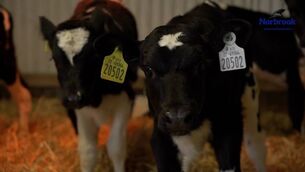"A good leader trusts people to do the job"

Alan Holland left an academic career in UCC’s Computer Science Department to found Keelvar in 2012 to commercialise artificial intelligence products across a wide range of industry.
DELOITTE LEADERSHIP SERIES: Alan Holland, founder & CEO of Keelvar
Keelvar has become a company with an enviable international recognition after only a decade in business. Utilising artificial intelligence and data science to provide intelligent automation solutions for more effective and efficient procurement decisions, its client list includes many multinational brands such as Coca-Cola, Siemens, Associated British Foods, Tesco and Nestlé. “Our global customers must constantly make smart decisions about supplier choices that weigh many cost and non-cost factors,” Alan explains. “Keelvar brings intelligent automation to help strategic sourcing teams be significantly more effective in making supplier decisions, while driving more savings and reducing risk to their business.”
Beyond its technology, the company is focused on attaining a high standard of customer service and driven to be agile, responsive and supportive in all aspects of the business. “What was becoming evident even ten years ago was how much commerce was moving to the internet, which was producing opportunities and challenges. If you are a large company like Siemens, Nestle, Coca-Cola or Amazon, you have supply chains with thousands of suppliers and hundreds of thousands of products, and how do you negotiate with them at scale? And that, in essence, is the challenge we help our customers deal with — how to find efficiencies in markets that are becoming more and more complex.”
The key is having computational systems capable of embracing this complexity and simplifying these “big complex jigsaw puzzles” via computer science and AI. “If you want to be good at managing and negotiating with suppliers, you’ve got to have advanced systems — and that is why we work with some of the biggest companies in the world.”
Keelvar has raised over €40 million from investors since 2020, with €24 million raised last May, as the company targets the U.S. market with its offering to major conglomerates of ‘rich information’ to help avoid waste and reduce costs. “We have a relatively low profile locally, but if you look at many brands with immediate international recognition such as Mercedes Benz, Caterpillar, Samsung, Microsoft and Volvo — effectively a long list of the world’s top companies who choose to work with us when they are designing their supply chains.”
The company’s current 115 employees are a long way from the start-up situation a decade ago of just two. “Things certainly were not easy back then, and there wasn’t a lot of capital floating around. It was a tough slog in the early days, sourcing projects and making things flow successfully from end to end. We kept to a tight team for the first five years, building the product for a small number of customers who recognised what we were good at.”
John, who recently returned to Deloitte after a year in industry, provides audit and advisory services to clients across a variety of industries including pharmaceutical, healthcare, education and manufacturing. John also experienced a mid-life career change, having retired from professional rugby following a decade playing for Munster and Ireland, and initiating a new career in accountancy in 2008.

He wondered how challenging it was for Alan to make a similar transition from the relative peace of academia to taking Keelvar into the high-risk environment of international business. “It was an itch I needed to scratch and helped by the fact that companies who were familiar with our work were knocking on our door asking for solutions to their problems. Allied to that was the fact that I had grown up in an entrepreneurial family.”
His father left a position with Carbery Milk Products to set up his own chemical business while Alan was still in school, allowing him a front-row seat to the trials and triumphs of private enterprise. “All of us in the family pitched in and played a part, whether it was designing a logo, acting as receptionist or helping with the accounts. There was no such thing as venture capital available in the 1980s, we did whatever it took to make it work.”
Having gotten his first computer in his early teens, an early aptitude for mathematics brought him to third level computer science and a PhD at UCC’s new AI lab, which led in turn to seven years lecturing there. His interest in the fields of artificial intelligence and e-commerce eventually prompted the formation of Keelvar — itself inspired by the Irish word ‘ciallmhar’ — translating as ‘sensible’. “I was following in my father’s footsteps in some ways by starting up Keelvar. We did lack experience but managed to successfully conclude a number of early deals with companies like Logitech, Associated British Foods and Siemens that were strong enough to give our then small team security to keep going. There was a mutual trust among us, we knew each other’s respective strengths, we were all fully committed and knew we could deliver. We never lost any of that core team, we were all very united and strong.”
A steady and assured pace of growth characterised Keelvar in the early years, “we were content to develop in third or fourth gear while other companies in fifth gear sometimes had to reverse,” he recalled. In the same way he had experienced success through every individual pulling their weight in his family firm, Alan maintained a grounded approach in his management style: “We look for people who want to solve problems, not hero types who come in all guns blazing. We prefer to trust people to do the job and not be micromanaged. I like to hire people who know more about a subject than I do.”
Deal by deal, Keelvar’s growth continued, as the addition of new clients saw the company’s employee numbers increase accordingly. “Gathering speed and scale, we were getting stronger and stronger. Transparency was key. Customers looked at us, saw the product’s potential and the brains behind it. Everything we built would benefit all customers. The simplicity of that strategy encouraged the buy-in to Keelvar. And it is a simple strategy that keeps our people united. Having overly complex arrangements doesn’t engineer trust effectively — whereas having simple rules of thumb does.”
Given the company’s current growth to a workforce of 115, and with further increases to come, John wondered how Alan’s leadership style has changed to stay in tune with expanding facilities and personnel numbers. “Your business isn’t scaling properly if you’re still trying to do the things you did when the employee numbers were 15 and under. What you need is your leadership team replicating the same approach, so I spend a lot of time with that team reinforcing our ways of working. And while you do need to formalise processes that in the past were informal, you need to do it while minimising those formalities.”
In its current growth phase, Keelvar leadership is keeping a keen eye to future opportunities, while maintaining those previous strategies which provided the bedrock of its success. “It’s about keeping what we had when we were smaller and growing it as we move forward. Staying focused on what’s ahead is key, but always remembering the good things that got us here.”








